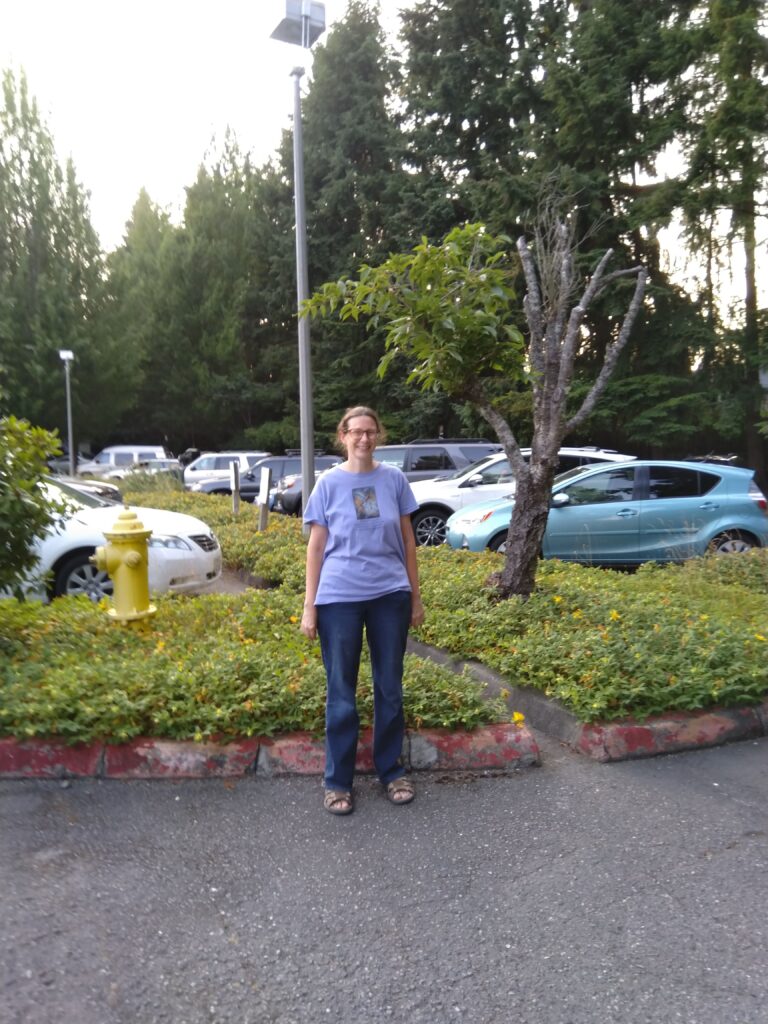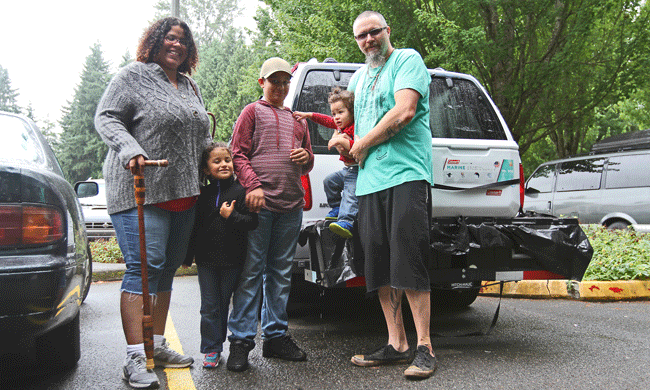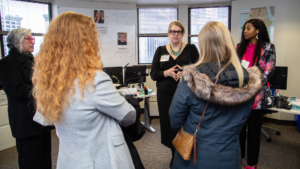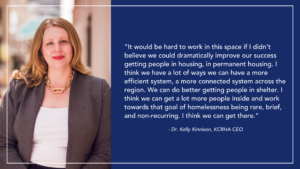When the Scofflaw Ordinance began to have an overwhelming effect on people living in their vehicles, some of the members of Lake Washington United Methodist (LWUMC), including Sandi Hunt and Karina O’Malley, saw a need for a place where they could feel safe. In partnership with the church, they invited people to park in the church parking lot overnight. That was the beginning of their Safe Parking Lot program in 2011.
A longstanding servant of her community, Karina began volunteering with her mother from a young age. Her mom, a sociological academic whose work was primarily focused on income equality, regularly included her in acts of service. Through college and beyond, Karina continued to volunteer her time at shelters and encampments with her church. Starting in 2008, she served on the advisory committee and board of The Sophia Way until 2020, and even as Interim Executive director in 2012 and 2013.
Setting Up the Safe Lot
In 2013, Karina began serving as the Safe Parking Program Coordinator of her church, and heard that women felt vulnerable parking in a lot that was unregulated rather than dedicated to women. So, she decided to meet that need. LWUMC also joined forces with churches in Redmond to help start parking lots to serve men and couples who needed a place to stay.

Safe Parking Program Coordinator
When LWUMC opened up the church building to 65 people from the Tent City 4 Encampment—with whom the church had a long standing relationship—it changed the program. As they formed Camp Unity, these individuals played a large role in building camaraderie by serving as 24/7 security and hospitality. When Camp Unity departed from the church in 2013, Karina and others from LWUMC asked themselves how they might reorganize the safe lot to better serve their unhoused neighbors.
We Have Two Questions
The safe parking lot is now open 24/7, with volunteers available to open the building a few hours in the morning and evening so that people who live in their cars have a chance to freshen up, get some food, and mingle. News of the church’s generosity has quickly spread – with donations pouring in from the community, and support from social workers and the Kirkland Police Department who are both eager to help refer people to a safer place to park. Now that the program is more established, they are also listed as a resource on the 2-1-1 service connection hotline.
“We have two questions,” said Karina “One, what kind of vehicle? And two, who’s in your car?” At this time, the lot is open to people in cars only, not RVs, and they serve women, trans people, and anyone who has a child under 18 with them. On average, the lot expects about 30 people each night, but they’ve seen as many as 50 cars with up to 65 people who need a safe place to stay. Having partnerships with other churches has been crucial during peak times, so that they can send overflow to another nearby lot.
Emergency Housing Vouchers: A Phenomenal Resource
People living in vehicles have traditionally been underserved by the crisis response system—but in April 2021 there was a new opportunity to connect vehicle residents to stable housing. The federal government sent 1,300 Emergency Housing Vouchers (“EHVs”) to King County as part of the effort to address homelessness caused by the economic effects of COVID. In partnership with the public housing authorities and the RHA, Karina’s safe parking program received a set of vouchers.
Karina wants everyone to know that “EHVs are an incredibly life changing and phenomenal resource.” After receiving two sets of 11 vouchers, Karina has had great success – placing 12 people in housing and another 8 with vouchers in hand and actively looking for a place to rent. She considers her program an ideal match for EHVs based on the eligibility requirements that a person must be unsheltered, but still stable enough to endure the application process and be relatively self-sufficient when they are housed. Karina’s team focused on people who have lived in the parking lot for at least a year, including those who have been involved with the program on and off. “With the first 11 vouchers we were unable to offer it to everyone meeting the criteria, but with the second set we were able to offer it to everyone who had been in the lot for over a year.”
However, she has some critiques as well, “the band is narrow for who is able to use them based on the limited resources and support that comes along with them.” She considers many of those utilizing her program to be quite capable, and although the voucher allows individuals to cap the rent they pay at 30% of their income – the expenses add up when you include the costs of utilities, transportation, food and other bills for basic needs. The church has been able to pool resources together to throw moving parties where donors can contribute furniture and cookware as well as money for other move-in costs. Once a person is housed, they are always welcome to come back and visit their friends.
Though this program is not open to volunteers from the public, there are still other opportunities to get involved. The church accepts donations, and if you’re an organization looking to start your own safe lot or similar program, Karina has some words of wisdom: “Start small! Start small so that you itch to grow, instead of starting so big you get overwhelmed—and be patient.” She recalls the beginning of this program, during the first two years her team wondered if it was useful at all, but now she looks at the amount of growth they’ve accomplished—and the people they’ve helped—with pride.
As the RHA considers expanding the use of Safe Lots for people living in vehicles, we look to Karina as an inspiration.
To learn more about the LWUMC Safe Parking program, or to donate, visit: https://lakewaumc.org/safe-parking-program/



